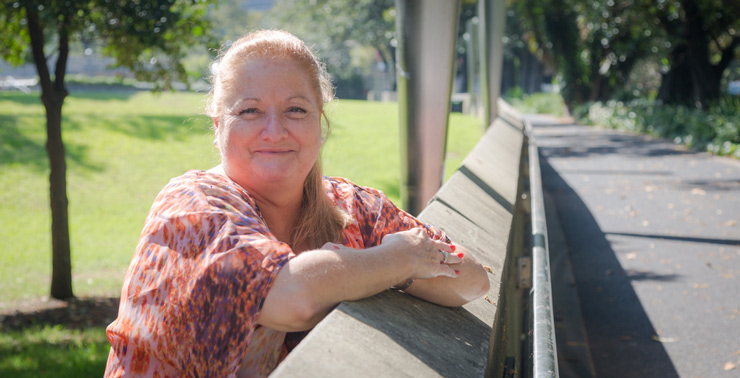Our families or loved ones are our best support network. We can rely on them when we need a hand. In the mental health sector, they may be the ones who actively cares for a consumer and supports them through recovery. However amongst obsessive-compulsive disorder (OCD) consumers, the family can potentially become part of a person’s behaviours, through accommodation.
Family accommodation is the modifications made by an individual to alleviate distress of another who is suffering from OCD. Modifications include parents, spouses or siblings taking part in the daily routines with the sufferer to avoid provoking anxiety.
Dr Rocco Crino, a senior Clinical Psychologist and Associate Professor at Charles Sturt University, describes family accommodation as a common occurrence in OCD consumers.
“Family accommodation is where individual family members are involved in some way in the persons rituals. We know it’s very prevalent in children with OCD, who involve their family. With children its always been the case that families have been involved, but less so with adolescents and adults.
“However research is pointing to the fact that family accommodation amongst all age groups is fairly common and it can be associated with an individual’s lack of progress in recovery and symptom severity.”
Dr Crino has seen various accommodation rituals throughout his career. He says family members are only trying to help the individual and relive them of the stress, without knowing that their actions are playing a role in the compulsive behaviours.
“It can be anything from providing reassurance through to helping the person perform their rituals or avoiding things that might trigger the rituals. Often the reasons behind it are to prevent stress in the individual or to try and help them in some way or to reduce their distress or anxiety. They do it for good reason, in order to help the person cope, to stop distress.
“In the research that we’ve done into why family members become involved in rituals, it was mostly to prevent the individual from becoming distressed because they love the person and feel sorry for them.”
Joanne (not her real name) is a high school student who has OCD. While she doesn’t display signs of family accommodation, she says that family can still impact her rituals.
“My family doesn’t form a direct part of my compulsive behaviours, however just as anyone else can, they have the ability to trigger a reaction based on their behaviour. Family has more of an impact on my compulsive behaviour as they play a large role in the environment that I’m in, directly impacting the severity of my triggers and mental state.”
While her symptoms haven’t majorly impacted her family, Joanne says they have had to become accustomed to certain rituals.
“Small things have had to change, for example my siblings know now that if they want a high five, it’s going to have to be a high ten instead, or when setting the table they know that because I can’t use knives. I’m terrified of cutting myself accidentally and being placed in the situation when I might have to cut myself intentionally to even the sensation, so they need to set the table differently at my spot. These things however have become part of the normal running of our house.
“Some days they have to be more understanding, if I snap at them for no apparent reason, and some days they have to accept that I’m going to have a really hard day and they will just need to stand by me in that.”
Dr Crino is quick to reassure that family members should always support and care for a loved one with OCD. While it may seem unhelpful for family members to place themselves in a situation where they form part of a person’s rituals, Dr Crino says family members are not at fault as the symptoms of OCD are difficult to understand for those without it.
“I think it’s more that the OCD has no logic associated with it. To wash your hands because you think you’re contaminated is fine if you do it once but to do it 40 times to check the front door, to repeatedly count things, it doesn’t make sense for someone without OCD. But in order to prevent the distress, they find themselves wrapped up in it. In some cases, it can lead to confrontation and end up in arguments and more distress.”

WayAhead mental health Educator Julie Leitch
Julie Leitch is a mental health educator at WayAhead who has managed to control her OCD symptoms thanks to cognitive-behaviour therapy from Professor Crino. However, before she was properly diagnosed, family accommodation rituals dominated Julie’s life. What started for her husband as simply checking things turned into something much more stressful.
“When I got married, I had the responsibility of looking after my husband and a house, so my OCD thoughts increased along with my rituals,” says Julie.
“Over time I had to get him to check more things; is the stove off, is the front door locked, is the back door locked and are all the windows locked. Over eight years the checking became more frequent and the reassurance was becoming a problem. At first I think my husband thought I just had some quirks but as he became more involved he could see that I was very distressed and needed things to be checked and to have reassurance. After six or seven years it did start to affect our social life, I could no longer get to places on time due to rituals like trying to shower, getting dressed, locking up… all these things took hours.”
Julie’s husband Dennis says it was a gradual process that led to him becoming involved in the rituals
“I did these things because I loved Julie and did not want to see her so distressed.
My involvement with OCD was very slow and by the time I realised how entrenched I had become it was too late, I seemed to be stuck with it. I would say I have already checked but she would reply if you love me you will check them again. I later learned that the anxiety in people with OCD is so great that they will do whatever it takes to get reassurance from someone.”
There are many unknowns as to why people engage in family accommodation. Research into family involvement in OCD treatment amongst adults is limited but studies have shown that those who involve families in their treatment have better results.
After seeking professional help from Professor Crino, Dennis says he had to change his own behaviour towards Julie.
“I was told I was no longer to do any rituals or give any reassurance. While this was extremely hard for me to do and also watch Julie’s distress, it was helping her. Julie did a three-week treatment program. At the end of three weeks Julie was a different person.
“It was another twelve months to two years before we realised what wonderful progress she had made. By not engaging in the rituals or reassurance during the treatment and afterwards, I think it has helped Julie get on top of her OCD.”
During her recovery, Julie says she could sense the difficulties that Dennis was experiencing in order to help her recover.
“It must have been terrible for Dennis but he never complained. Many times during my treatment I would beg him to just check once or to tell me that things were locked and he just held his ground and would say ‘the doctor said I am not allowed to answer that question.’ I think this was the hardest thing for him, as he did not want to see me suffering.”
Within his practise, Dr Crino has seen an increasing number of cases where family accommodation is occurring. He says the best thing for family members to do in this instance is to remove themselves from the rituals.
“No matter the situation it is best to gently disengage. If the person is undergoing treatment it’s a good idea for family members to be involved in that treatment, so that they gradually withdraw their inadvertent support.”
While there are many avenues that OCD consumers can take, family members who find themselves apart of a family accommodation ritual should also seek support and education on how best to help their loved one.
“There’s always the possibility of them attending the WayAhead support groups and getting information from these groups,” says Dr Crino.
“Alternatively they can seek information from their GP and ask for a referral to a specialist who deals with OCD to find out how best to assist the individual. So there are ways that they can be educated about what to do and what not to do.”
By Harry Easton

